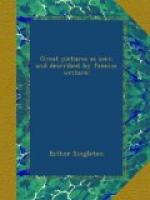Opposite this window, on the white wall, is a small shrine or picture (I can’t see which, for it is in sharp retiring perspective), with a lamp before it, and a silver vessel hung from the lamp, looking like one for holding incense.
The bed is a broad four-poster, the posts being beautifully wrought golden or gilded rods, variously wreathed and branched, carrying a canopy of warm red. The princess’s shield is at the head of it, and the feet are raised entirely above the floor of the room, on a dais which projects at the lower end so as to form a seat, on which the child has laid her crown. Her little blue slippers lie at the side of the bed,—her white dog beside them, the coverlid is scarlet, the white sheet folded half way back over it; the young girl lies straight, bending neither at waist nor knee, the sheet rising and falling over her in a narrow unbroken wave, like the shape of the coverlid of the last sleep, when the turf scarcely rises. She is some seventeen or eighteen years old, her head is turned towards us on the pillow, the cheek resting on her hand, as if she were thinking, yet utterly calm in sleep, and almost colourless. Her hair is tied with a narrow riband, and divided into two wreaths, which encircle her head like a double crown. The white nightgown hides the arm raised on the pillow, down to the wrist.
At the door of the room an angel enters; (the little dog, though lying awake, vigilant, takes no notice.) He is a very small angel, his head just rises a little above the shelf round the room, and would only reach as high as the princess’s chin, if she were standing up. He has soft grey wings, lustreless; and his dress, of subdued blue, has violet sleeves, open above the elbow, and showing white sleeves below. He comes in without haste, his body, like a mortal one, casting shadow from the light through the door behind, his face perfectly quiet; a palm-branch in his right hand—a scroll in his left.
So dreams the princess, with blessed eyes, that need no earthly dawn. It is very pretty of Carpaccio to make her dream out the angel’s dress so particularly, and notice the slashed sleeves; and to dream so little an angel—very nearly a doll angel,—bringing her the branch of palm, and message. But the lovely characteristic of all is the evident delight of her continual life. Royal power over herself, and happiness in her flowers, her books, her sleeping and waking, her prayers, her dreams, her earth, her heaven....
“How do I know the princess is industrious?”
Partly by the trim state of her room,—by the hour-glass on the table,—by the evident use of all the books she has, (well bound, every one of them, in stoutest leather or velvet, and with no dog’s-ears,) but more distinctly from another picture of her, not asleep. In that one a prince of England has sent to ask her in marriage: and her father, little liking to part with her, sends for her to his room to ask her what she would do. He sits, moody and sorrowful; she, standing before him in a plain house-wifely dress, talks quietly, going on with her needlework all the time.




